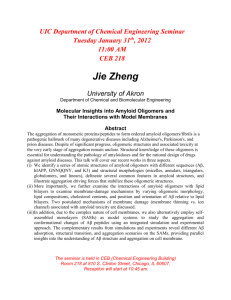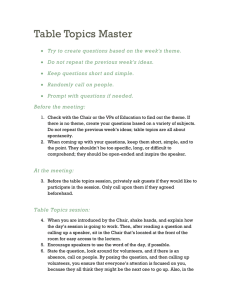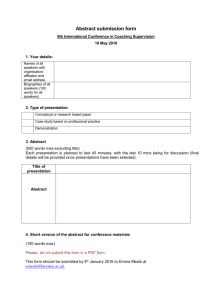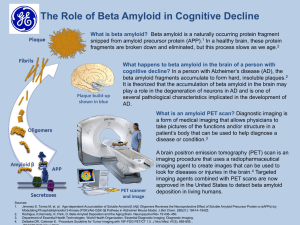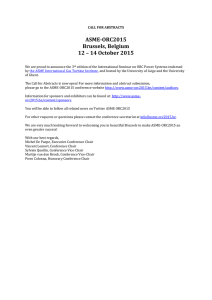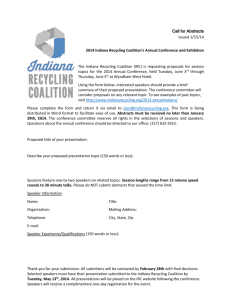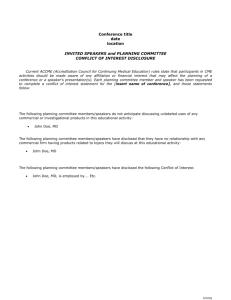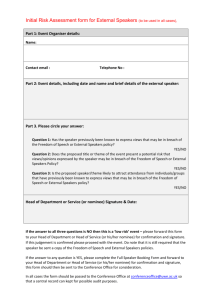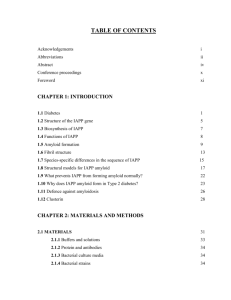Molecular Mechanisms and Physiological Consequences of Protein
advertisement
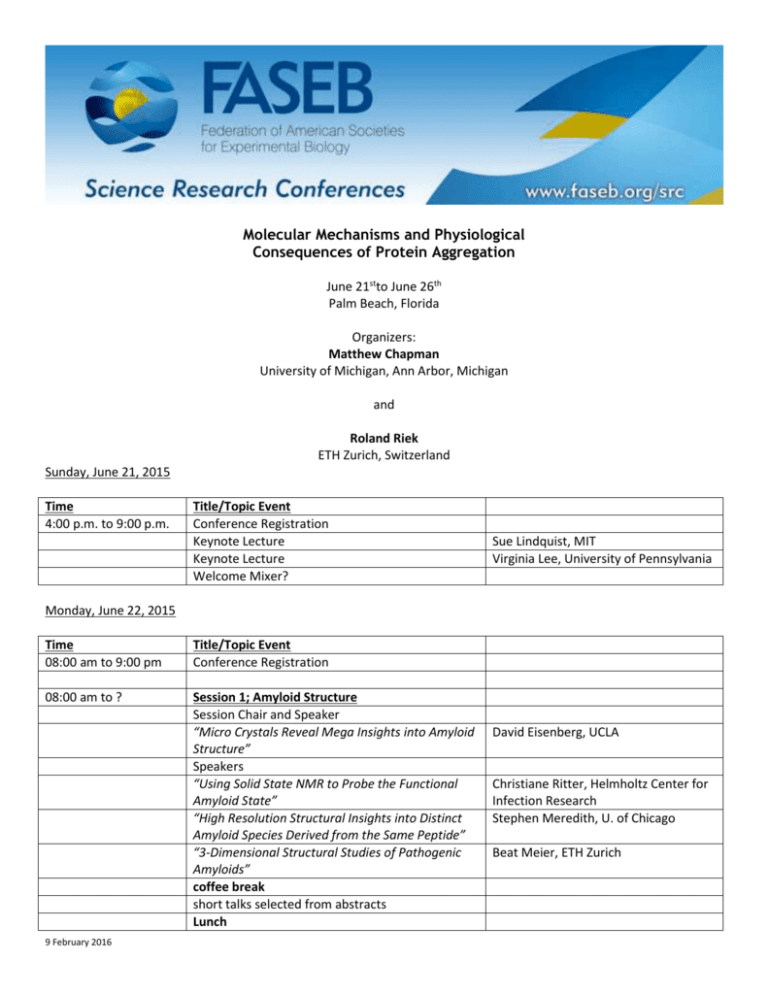
Molecular Mechanisms and Physiological Consequences of Protein Aggregation June 21stto June 26th Palm Beach, Florida Organizers: Matthew Chapman University of Michigan, Ann Arbor, Michigan and Roland Riek ETH Zurich, Switzerland Sunday, June 21, 2015 Time 4:00 p.m. to 9:00 p.m. Title/Topic Event Conference Registration Keynote Lecture Keynote Lecture Welcome Mixer? Sue Lindquist, MIT Virginia Lee, University of Pennsylvania Monday, June 22, 2015 Time 08:00 am to 9:00 pm Title/Topic Event Conference Registration 08:00 am to ? Session 1; Amyloid Structure Session Chair and Speaker “Micro Crystals Reveal Mega Insights into Amyloid Structure” Speakers “Using Solid State NMR to Probe the Functional Amyloid State” “High Resolution Structural Insights into Distinct Amyloid Species Derived from the Same Peptide” “3-Dimensional Structural Studies of Pathogenic Amyloids” coffee break short talks selected from abstracts Lunch 9 February 2016 David Eisenberg, UCLA Christiane Ritter, Helmholtz Center for Infection Research Stephen Meredith, U. of Chicago Beat Meier, ETH Zurich Session 2; Mechanisms of Protein Aggregation in Vitro Session Chair and Speaker “Molecular Insights into Cooperative Protein Folding” Speakers “Protein Aggregation from Theory to Reality” “Protein Aggregation of Beta-Microglobulin at the Atomic Level” ”The Molecular Theory of Protein Aggregation” short talks selected from abstracts Jane Clark, Cambridge Tuomas Knowles, Cambridge Sheena Radford, Leeds Rohit Pappu, Washington University Tuesday, June 23, 2015 Time Title/Topic Event 08:00 am Session 3; Ordered Protein Aggregation and Nanotechnology Session Chair and Speaker “The Amyloid World Hypothesis” Speakers “Amyloid Nanotubes” “Replication of Amyloids in vitro and in vivo” “Using Designer Gamma Bodies to Probe Amyloid Assembly” coffee break short talks selected from abstracts Lunch Session 4; Functional Amyloid Session Chair and Speaker “Putting Yeast Prions to Work” Speakers “Diversity and Biogenesis of Microbial Amyloids” “Long Term Memory Potentiation” “The Biology of Hydrophobins” short talks selected from abstracts Ehud Gazid, Tel Aviv University John Tovar, John Hopkins Claudio Soto, University of Texas at Houston Peter Tessier, RPI Tricia Serio, University of Arizona Daniel Otzen, Aarhus University Eric Kandel, Columbia University Margaret Sunde, University of Sidney Wednesday, June 24, 2015 Time Title/Topic Event 08:00 am to ? Session 5; Proteotoxicity and Aging Session Chair and Speaker “What Goes Wrong in Amyloid-Related Toxicity” Speakers “Toxicity of Cellular Protein Aggregates” “The Mechanism of Toxicity of Mammalian 9 February 2016 Ralf Langen, USC Bill Balch, Scripps Research Institute Adriano Aguzzi, University of Zurich Prions” “In vivo NMR of α-synuclein Reveals Structure and Toxicity Relationships” coffee break short talks selected from abstracts Lunch Session 6; Mechanisms of In Vivo Amyloidogenesis Session Chair and Speaker “In vivo Amyloid Formation” Speakers “Amyloid-Induced Proteostatic Meltdown” “Mass Spectrometry on Living Cells” “How Protein Aggregates are Cleared by the Autophagy System” short talks selected from abstracts Phil Selenko, FMP Berlin Hilal Lasheuel, ETH Zurich Rick Morimoto, Northwestern University Paula Picotti, ETH Zurich Ron Kopito, Stanford Thursday, June 25, 2015 Time 08:00 am to 9:00 pm Title/Topic Event Conference Registration 08:00 am to ? Session 7; Cellular Response and Pathogenesis Session Chair and Speaker “Cellular Responses to Protein Aggregation” Speakers “Flavenoids can Reset Protein Homeostasis in Aging” “Interaction Maps of the Protein Network” “Cellular Checkpoints in the Protein Folding Network” coffee break short talks selected from abstracts Lunch Session 8; Mechanisms of In Vivo Amyloidogenesis Session Chair and Speaker “Toxicity of α-Synuclein to Membranes” Speakers “Moving Amyloid Deposits Between Cells” “Fighting Fire with Fire: Amyloid Interruption of Amyloid Formation” “Extracellular Amyloids Produced by Staph cause Membrane Toxicity” short talks selected from abstracts Friday, June 26, 2015 9 February 2016 Andy Dillin, UC Berkeley Pam Maher, Salk Institute Jonathan Weissman, UCSF Lila Gierasch, University Mass Amherst Andrew Miranker, Yale University Marc Diamond, Washington University Joel Buxbaum, Scripps Research Institute Blaise Boles, University of Iowa Time Title/Topic Event 08:00 am to ? Session 9; Therapeutic Interventions Session Chair and Speaker “Chemical and Biological Strategies that Adapt the Proteostasis Network to Ameliorate Amyloid Toxicity” Speakers “Mechanism of Amyloid Beta Aggregation and the Role of Natural Inhibitors” “Small Molecules that Inhibit Amyloid Formation” “Rational Design of Small Molecules that Ameliorate α-synuclein Toxicity” coffee break short talks selected from abstracts END OF CONFERENCE For additional information contact: FASEB Science Research Conferences 9650 Rockville Pike Bethesda, MD 20814 www.faseb.org/src 9 February 2016 Jeff Kelly, Scripps Research Institute Sara Linse, Lund University David Schubert, Salk Institute Fredrik Almqvist, Umea University
